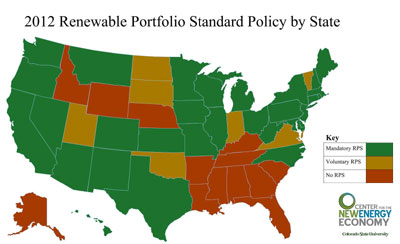Vermont is swimming against the tide of ALEC and other Koch-sponsored Americans for Prosperity bills that are moving through the states to make it harder to grow renewable energy.
In Vermont, the legislature voted to increase solar net-metering to reward homeowners and businesses for installing solar systems. They raised the net-metering cap substantially – from 4% of a utility’s peak load to 15%.
That is, utilities no longer have to compensate customers when they send solar back to the grid when net-metering payments surpass 15% of its peak demand from the previous year or from 1996, whichever is greater.
Net metering allows people with on-site solar to first use solar energy for themselves and then sell any excess back to utilities at the full retail price. Utilities, in turn, sell the energy to neighboring homes and businesses.
While Vermont’s largest utility and one of the most progressive in the country, Green Mountain Power, doesn’t believe there should be a cap at all, the situation is quite different in states where legislation by ALEC is being pushed.
Repeal Bills Sprout in Numerous States
Until this year, we didn’t hear much from utilities, but since ALEC developed a model bill to eliminate net-metering – "Updating Net Metering Policies Resolution," it’s suddenly become controversial for utilities across the country.
After meeting a measly 1% cap, Missouri utilities say they are no longer required to provide rebates for solar. Last year, solar sales surged in Missouri, adding 1,700 jobs in the state and if it were in place through this year, that number would double, according to Missouri Solar Energy Industries Association.
In Kansas, bills were introduced to eliminate net-metering, but after negotiations, have been watered down instead. They raised the maximum size of solar arrays eligible for net metering and cut the payment that people receive.
This week, the State Senate voted to repeal the Renewable Portfolio Standard (RPS), but it was rejected by the Assembly.
ALEC and Americans For Prosperity have made repealing the RPS a top priority, and the latter has been running statewide radio and TV ads.
The RPS – which requires 20% renewable energy by 2020 – has been driving growth of the wind industry there since 2009. It has created 13000 jobs with close to 2 gigawatts installed, and factories that make wind components have sited there. Kansas gets over 10% of electricity from wind and is benefiting from lower electric prices. And Kansas City is about to become a leading city for solar, installing rooftop systems on 80 municipal buildings.
Republican State Senator Forrest Knox says the RPS distorts the free market and therefore will drive up costs now that the federal production tax credit has expired, which has artificially propped up growth. Other senators that voted for repeal say it’s time for the industry to stand on its two feet and they expect electric prices to rise 40%.
Kansas should be the first in the nation to abandon cumbersome government mandates on energy production, according to Jeff Glendening, state director of Americans for Prosperity, reports Topeka Capital Journal.
At the same time the Kansas Senate passed the Promoting Employment Across Kansas program – which subsidizes companies that relocate to or expand in Kansas.
Bills to kill net-metering and impose fees on solar owners have also been introduced – and so far been defeated – in Utah and Washington. In Utah, however, they passed a bill to study the value of distributed energy.
An Ohio bill under consideration would eliminate the RPS.
Indiana just passed a law that eliminates the state’s energy efficiency standard and ends ratepayer-funded energy efficiency programs, such as free energy audits and subsidized upgrades, at the end of 2014.
Last year, ALEC failed to roll back state RPS after getting some 120 of its model bills introduced. They added net-metering to their list for this year. Arizona passed a modified bill that is already having a negative impact on solar sales.
30 states have a mandatory RPS and 7 have a voluntary one. Over 40 states have net-metering laws.

Read a really long article on the battle between rooftop solar and utilities:
